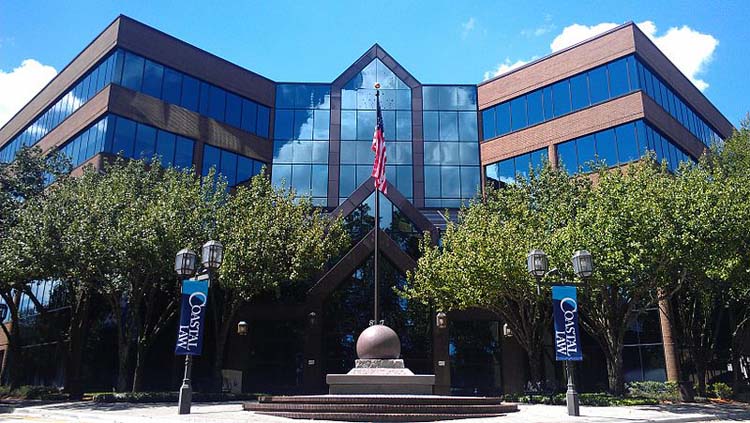Florida Coastal sues ABA over finding of noncompliance with accreditation standards

Florida Coastal School of Law/Wikimedia Commons.
Florida Coastal School of Law, which the ABA Section of Legal Education and Admissions to the Bar has found to be out compliance with various standards regarding admissions and academic support, filed a federal court lawsuit against the organization Thursday, alleging that the ABA's accreditation finding violated the school’s due process rights.
The complaint, filed in the U.S. District Court for the Middle District of Florida, in Jacksonville, refers to the Department of Education in December 2016 cutting off federal loan money to Charlotte School of Law, another InfiLaw school, after it was placed on probation by the ABA. That law school closed in 2017.
“InfiLaw officers have information and belief that during the prior administration one or more DOE officials coerced, pressured or significantly encouraged the aBA to take adverse accreditation actions against for-profit law schools, including schools owned by InfiLaw,” states the complaint, which also claims that the school has been treated unfairly by the ABA.
“InfiLaw officers have information and belief that some ABA officials are biased against InfiLaw-owned law schools because of their propriety status. DOE regulations require the ABA to control such bias,” the complaint states.
See also: ABA should never have accredited now-closed Charlotte School of Law, lawsuit claims
The law school is represented by Paul D. Clement, a former U.S. solicitor general in the George W. Bush administration, who is now a Kirkland & Ellis partner; Viet D. Dinh, another Kirkland partner who served as an assistant attorney general during same administration, and Christopher Bartolomucci, a Kirkland partner who served as White House associate counsel to President George W. Bush and was associate special counsel to the U.S. Senate Whitewater Committee.
Barry Currier, the ABA’s managing director of accreditation and legal education, was not available for comment at press time. The ABA has a policy against commenting on pending litigation. The section in an Oct. 12 letter informed the law school that the committee found it to be out of compliance with:
-
• Standard 301(a), which states that law schools must have a rigorous program to prepare students to pass a bar exam and practice law.
• Standard 309(b), which addresses academic support to give students a “reasonable opportunity” to complete their studies and become lawyers.
• Standard 501, sections (a) and (b). The first part directs that accredited law schools have sound admissions policies, while the second part mandates that people who don’t appear capable of graduating from law school or passing a bar exam should not be admitted as students.
• Interpretation 501-1, which discusses factors to consider in admissions.
After a March hearing, the accreditation committee found that the law school has come into compliance with Standard 501(a). For the other standards, the committee directed the law school to develop a reliable plan, including admissions data and methodology, and said that a fact finder will be appointed by the managing director of the ABA Section of Legal Education and Admissions to the Bar.
A press release about the lawsuit states that entering credentials for Florida Coastal’s Spring 2018 class were higher than or equal to 52 other ABA-approved law schools.
In April, Scott DeVito, the law school’s dean, told the ABA Journal that they are not accepting students with LSAT scores below 145. The school’s spring 2018 class had a median LSAT score of 150 and the class’s 25th percentile LSAT score was 147, according to DeVito.
According to the law school’s Standard 509 Information Report for 2017, its 25th percentile LSAT score was 145, and its median LSAT score was 148. Among the first-year class, 25.7 percent of students left through nontransfer attrition.
The lawsuit also claims that the ABA’s accreditation standards are “arbitrary and capricious” regarding its use of bar passage data to find that Florida Coastal was out of compliance. Standard 316, which addresses bar passage rates, was not mentioned in public information from the October or April accreditation findings for Florida Coastal. According to the lawsuit, the school’s February 2018 Florida bar passage rate was 62.1 percent for first-time test takers.
“Instead of enacting clear standards where every law school can be judged on the same playing field, the ABA has decided to arbitrarily attack a law school that not only has better metrics than many schools, in Florida, but it does so while assisting a large segment of disadvantaged law students in the process. For the sake of our students and the future of the profession, it is imperative that the ABA’s improper accreditation process stops now, with the filing of this suit,” Dennis Stone, president of Florida Coastal, said in the press release.



